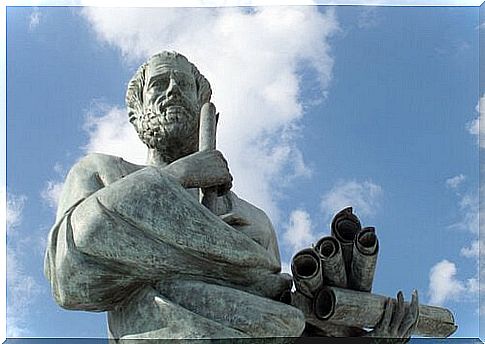Pathos, Ethos And Logos: The Rhetoric Of Aristotle

When we present our arguments, whether oral or written, we try to be persuasive. The public must understand our point of view, even before accepting our arguments. That’s what rhetoric is all about, getting others to accept our point of view. And who better to explain rhetoric than Aristotle? Plato’s student studies focused on rhetoric. Thus, Aristotle’s rhetoric consists of three fundamental aspects: pathos, ethos and logos.
In Aristotle’s rhetoric, pathos, ethos and logos are the three fundamental pillars. Ethos appeals to ethics, pathos to feeling or emotions, and logos to logic. Currently, these three aspects are considered different ways to convince an audience about a certain topic, belief or conclusion. While each aspect is different from the others, knowing all three will help us engage the audience we are targeting.
Pathos, ethos and logos
Aristotle’s pathos
Pathos means “suffering and experience”. In Aristotle’s rhetoric, this translates into the ability of the speaker or writer to provoke emotions and feelings in his audience. Pathos is associated with emotion, it refers to the appeal to the emotional side of the target audience. In short, pathos seeks to empathize with the audience. When the speaker uses their values, beliefs and understanding, they move the audience and communicate with them through a story.

Pathos is often used when the arguments to be exposed are very controversial. Since these arguments often need logic, success will lie in the ability to empathize with the audience. For example, in a discussion to legally ban abortion, we might describe babies as fragile and innocent beings to evoke sadness and concern from the public.
Aristotle’s ethos
The second aspect, ethos, means character and comes from the word ethikos, which means morality and moral personality. For speakers and writers, ethos is shaped by your credibility and identification with your audience. The speaker must be trusted and respected as an expert on the subject being discussed. For arguments to be effective, logical reasoning is not enough. Content must also be presented efficiently to become trustworthy.
According to Aristotle’s rhetoric, ethos is particularly important for creating public interest. The tone and style of the message will be key to this. Furthermore, it is how the speaker convinces the audience that he is qualified to speak on the subject, how his character or authority can influence the audience regardless of the message. For example, speaking to an audience as an equal, rather than passive characters, increases the likelihood that people will engage and actively listen to your arguments.
Aristotle’s logos
Logos means word, speech or reason. It is the use of reason and reasoning, whether inductive or deductive, to construct an argument. In persuasion, logos is the logical reasoning behind the speaker’s statements. Logos refers to any attempt to appeal to the intellect, to logical arguments.
Deductive reasoning argues that “if A is true and B is true, the intersection between A and B must also be true.” For example, in the argument “women like oranges” it would be true “women like fruits” because “oranges are fruits”. Inductive reasoning also uses premises, but the conclusion is just an expectation and may not necessarily be true because of its subjective nature. For example, the phrases “Pedro likes comedy” and “this movie is a comedy” can conclude that “Pedro will like this movie”.

Aristotle’s Rhetoric
In Aristotle’s rhetoric, logos was his preferred argumentative technique. However, in everyday life, everyday arguments depend more on pathos and ethos. The combination of the three is used to make essays more persuasive and is at the heart of strategy in discussion teams. People who dominate them have the ability to convince others to take a certain action or buy a product or service.
Even so, these days pathos seems to have a greater influence. Populist discourses, which seek to emote rather than provide logical arguments, seem to have greater meaning. The same goes for fake news or fake news. Some lack logic, but the public accepts them because of their great capacity for empathy. Being aware of these three strategies in Aristotle’s rhetoric can help us better understand those messages that try to persuade us through lies.









